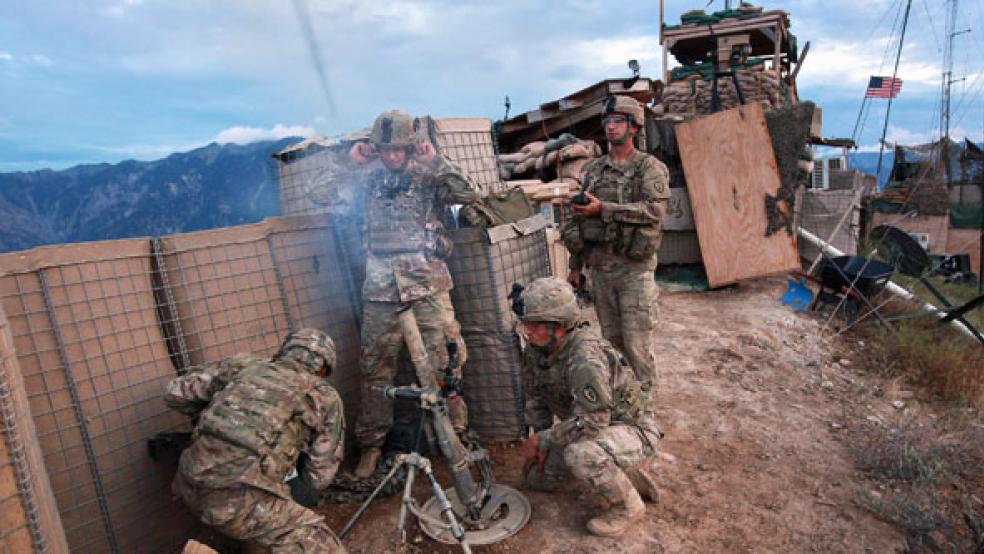Tensions are rising in Afghanistan ahead of Saturday’s presidential elections, with the Taliban increasing violence and candidates trading accusations that the vote to replace Afghan President Hamid Karzai would be rigged.
The latest violence occurred in the northern Sar-e-Pul province, where a provincial government candidate was killed, along with nine of his supporters. This follows an incident Wednesday in which a Taliban suicide bomber detonated explosives outside the Interior Ministry in Kabul, killing six guards.
Related: Afghan Quagmire Could Hold U.S. Troops Well Past 2014
Meanwhile, even before votes have been cast, frontrunners in the presidential election are warning that the vote would be invalid due to election fraud. In 2009, some one million votes were disqualified under suspicious circumstances. Now, Abdullah, one of the favored candidates, says he is concerned about “industrial-scale fraud,” while his chief rival, former finance minister Ashraf Ghani, added his concerns, telling the Guardian, "People will not be deprived of their right to good governance."
These names are most likely unfamiliar to most westerners, although the majority of them have been active in Afghan politics since the United States invaded in 2001. And while anonymous, their importance to the west is paramount.
That’s because the winner of Sunday’s election is expected to negotiate a long-term security agreement with the United States. That agreement would determine what kind of presence, if any, the U.S. military would have in Afghanistan beyond 2014. It would also determine the size of the commitment from American NATO allies, and how much the United States would spend to prop up Afghan institutions.
The United States put talks over the agreement on hold when the White House determined that Karzai was not negotiating in good faith. The expectation, both within the White House and the Pentagon, is that whomever wins would make a deal quickly so the Pentagon can determine what it needs to complete the mission.
Related: The U.S. Has Finally Outfoxed Hamid Karzai
Some 27 candidates initially submitted nominations when the election process first began in 2013, but that number has whittled down to 11. Of those 11, only a few are expected to compete for office.
It’s also important to keep in mind that there’s a strong possibility that there could be two elections. The first this Sunday would trim the field. Then, a second runoff, likely in May, would determine who is president. The frontrunners are:
Abdullah - Abdullah was the runner-up to Karzai in 2009, and lost narrowly. Despite winning 30 percent of the vote, he withdrew from a runoff election that year because he did not believe it would be fair, and has spent the last four years angling for the Afghan presidency. He is, by far, the favorite to win.
Related: The Afghan Report That Could Have Saved the US Billions
As the former foreign minister, Abdullah established ties with the western media, conducting interviews in both English and French. He is perhaps the best hope for a quick resolution to the security agreement, saying in February that Afghanistan needs a sustained U.S. presence there to maintain stability.
“When we are asking President Karzai to sign it, and when we say that it is in the interest of Afghanistan that that agreement is signed sooner rather than later, that means that we will be ready to sign it when time comes,” he said.
Mohammad Daud Sultanzoi - Sultanzoi, a pilot, dramatically escaped Afghanistan when the Soviets invaded in 1979, diverting a plane he was flying to Germany. He then spent 22 years as a pilot for United Airlines, settling in California.
Sultanzoi returned to Afghanistan in 2001 to represent the Ghazni province in parliament. He is fluent in English and considered a moderate, as well as a supporter of Afghan women’s right to vote. Given the years he spent in California, he’s also friendly to the United States.
Zalmai Rasul - A doctor by training, Rasul is former national security adviser to Karzai with deep ties to the west, including the ability to speak several European languages. He has accompanied Karzai on nearly every international trip the current president has taken, but is now distancing himself from the current Afghan president. He has pledged that he would increase ties with Washington if elected.
“I hope and I'm confident that the zero option will not be an option,” Rassoul said in an interview with CNN, adding that U.S. withdrawal is “not a good option for Afghanistan and therefore for the United States,” he said.
Mohammad Ashraf Ghani Ahmadzai - Ashraf Ghani, a former anthropology professor and World Bank executive, lived for years in the United States and is considered friendly to American interests. When the Taliban fell in 2001, he returned to Afghanistan and was instrumental in putting together the Bonn Agreement that shaped the new Afghanistan.
He briefly served in the Afghan government then returned to Washington n 2005, where he founded the Institute for State Effectiveness, a non-profit that develops nation-building strategies. He has returned to Afghanistan, but has faced criticism that he cannot connect with Afghan voters, and is widely expected to trail the other frontrunners.
Qutbuddin Hilal - Hilal is the only one of Afghan presidential candidates that has not served in the Afghan government before. Instead, he has spent the post-2001 years building an alliance with Hizb-e Islami, a group that is still fighting alongside the Taliban.
Hilal is not expected to receive a large portion of the vote. But he is expected to represent Afghans who want an Islamic government and to cut ties with the west. If he manages to sneak into a runoff, he would have a broad platform to spread anti-western views while promoting an Islamic government.
Top Reads from The Fiscal Times





